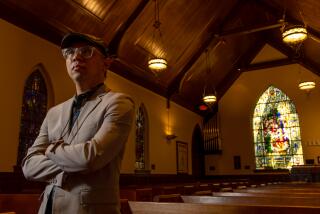Finding Hope in a Chinese Church
- Share via
It’s mid-February in Beijing. In front of an old church, a minister with a face wrinkled by life shook my hand and said, “Come back to see us often.”
Today, President Clinton will visit this very church, Chong Wen Men, for a glimpse of Christian life in China and to show that he cares about religious freedom there. The Chinese government would claim that this church represents China’s abundance of religious freedom. China critics in the U.S. will brand this visit as another show to hide the true face of religious persecution. Lost in all the rhetoric and the media showmanship will be a most important fact: This church represents great hope for further progress in China.
In February, I visited Chong Wen Men Church with a religious delegation appointed by President Clinton and invited by President Jiang Zemin to discuss issues of religious freedom. Having emigrated from China in 1985 unaware of a Christian presence in the country, I found myself that Sunday in a church packed with worshipers who could recite verses from the Bible and who eagerly sang along with the choir. I heard the choir singing hymns in Mandarin that day about love, the love of Christ.
Standing before the church’s Chinese characters for Immanuel, exuding confidence and joy, a young pastor introduced his guests from America. The old ministers of the church had explained to the delegation beforehand that a generation of possible ministers was lost in the spiritual desecration and oppression of the Cultural Revolution. Young people began to study Christianity again only after China began its major reforms 20 years ago. Now represented by the young pastor wearing a suit and tie, a new generation of religious leaders has risen in China.
One of our delegation’s religious leaders preached that day. As he talked about truth, honesty and devotion to God, the congregation zealously responded “Amen.” And in that church where Chinese from all walks of life gathered to listen to an American preach, the service seemed no different from any found in America. And as in churches in America, within that old church and in its heavenly choir music existed something ephemeral, something beautiful: hope.
Hope appeared in the fellowship between the young pastor and the American religious leader he introduced. It appeared in the hunger for spiritual salvation among those who responded “amen” eagerly. It appeared in the sense of comfort and pride on the old ministers’ faces that told of suffering in China’s more turbulent past. And as hope soared alongside the voices in the choir, no improvements to China’s current limitations of religious freedom seemed impossible.
President Clinton, during his visit to China, will witness this hope. Yet even if he tries to tell Americans about it, China critics will refuse to believe his church visit is anything more than a media show. Hearing the likes of Sen. John Ashcroft (R-Mo.), Rep. Nancy Pelosi (D-San Francisco) and Gary Bauer, president of the Family Research Council, condemn China as the worst persecutor of religious believers in recent days, I am reminded that the old minister with a face wrinkled by life complained when we first met that most Americans simply do not understand Christians in China or China itself. Many of America’s relentless critics of China continually prove him right.
To be sure, the success of Chong Wen Men cannot justify the abuses faced by religious believers throughout China. Unlike what the Chinese government claims, Sunday worship at this church does not mean religious freedom for China. But having seen this church and many other religious locations throughout the country where hope abounds, I would advise America’s professional China bashers, as the old minister had advised me: Visit China often. But in the meantime, their claim that all Chinese religious believers exist in misery remains not only inaccurate, but gravely irresponsible.
More to Read
Sign up for Essential California
The most important California stories and recommendations in your inbox every morning.
You may occasionally receive promotional content from the Los Angeles Times.













